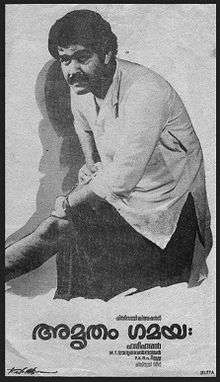Amrutham Gamaya
Amrutham Gamaya is a 1987 Indian Malayalam-language drama film directed by Hariharan, written by M. T. Vasudevan Nair and produced by P. K. R. Pillai. It features Mohanlal in the lead role, along with Geetha, Parvathy Jayaram, Vineeth, Thilakan, Devan, Babu Namboothiri and Karamana Janardanan Nair in major supporting roles. The film has no songs, but features a musical score composed by M. B. Sreenivasan.
| Amrutham Gamaya | |
|---|---|
 Poster designed by P. N. Menon | |
| Directed by | Hariharan |
| Produced by | P. K. R. Pillai |
| Written by | M. T. Vasudevan Nair |
| Starring | Mohanlal Thilakan Geetha Parvathy Jayaram Vineeth |
| Music by | M. B. Sreenivasan |
| Cinematography | S. C. Padi |
| Edited by | M. S. Mani |
Production company | Shirdhi Sai Creations |
| Distributed by | Shirdhi Sai Release |
Release date |
|
| Country | India |
| Language | Malayalam |
This film is known for its poignant expression of guilt, it portrays with great sensitivity the story of a doctor who tries to atone for a mistake that he committed as a student – a mistake that destroyed a family. Amrutham Gamaya is regarded as one of the best films of Hariharan[1][2] and one of the classic screenplay of Vasudevan Nair.[3]
Plot
The film is the story of Dr. P. K. Haridas (Mohanlal). When he was a senior student in Medical college, he unknowingly killed Unnikrishnan (Vineeth), a junior student, during ragging. The incident comes back to haunt him when he meets Unnikrishnan's poor family. As an act of atonement, he helps the poor family. He also helps Vineeth's sister, Sreedevi (Parvathy), to become a doctor. In the end Mohanlal commits suicide because of his depression.
Cast
- Mohanlal as Dr. P. K. Haridas
- Thilakan as Kurup
- Geetha as Bhanu
- Parvathy as Sreedevi
- Vineeth as Unnikrishnan
- Captain Raju as Suku
- Devan as Raghu
- Kuthiravattom Pappu as Kumaran
- Karamana Janardanan Nair as Medical Professor
- Rajya Lakshmi as Sarada
- Kunjandi as Kaakka
- Babu Namboothiri as Ilethu
- Kundara Johny as Dr. Rajan Thomas
- Kamala Kamesh as Sreedevi's mother
- Sukumari as Haridas' mother
- Manoj
- R.K Nair
- Vinodh
- Abu Sirkar
- Saudamini
- baby Sheema
- Indhumathi
- Balraj
- Mithran
- UnniNarayanan
- Vijayakumar
- Vineethan
- Lowel
Production
The film was written by M. T. Vasudevan Nair and directed by Hariharan.[4] It was their subsequent collaboration with Mohanlal and Geetha together again after Panchagni (1986). Unlike Panchagni, which was a women-oriented film, Amrutham Gamaya follows the character of Dr. Haridas played by Mohanlal. The title is derived from the lyric "mṛtyor mā amṛtaṃ gamaya" (meaning: "From death, lead me to immortality") of the Pavamana Mantra, a Hindu mantra. The film score was composed by M. B. Sreenivasan. This film does not feature any songs.[5]
Release
The film was released on 6 February 1987. On an interview in August 2000, praising Mohanlal's performance, Hariharan said that "he really surprised me. That was an amazing performance. In fact, he should have won a National Award for it. Have you seen the scene in which he injects pethidine into his thighs? That was simply great. And when he realises that the family he befriends is the family of the boy whom he had accidentally killed while ragging him in medical college, was heartbreaking. I don't know how he showed inner turmoil so beautifully. It was so subtle, so disturbing. The beauty of his performance is that he underplays emotions. Every muscle of his body reacts. For that one scene itself, he should have been given an award. I, the director, forgot myself when he was performing in Amrutham Gamaya. Why, all the unit members wept, while watching him perform".[6]
References
- Kumar, P. K. Ajith (9 August 2017). "Celebrating a fine half century of filmmaking". The Hindu. Archived from the original on 30 October 2017. Retrieved 30 October 2017.
- Anima, P. (31 January 2014). "Conquering Mind and Eye". The Hindu. Archived from the original on 30 October 2017. Retrieved 30 October 2017.
- "Screenplays for ever". The Hindu. 26 September 2014.
- Prakash, Asha (13 February 2015). "Drugs, not new in Malayalam Cinema". The Times of India. Archived from the original on 30 October 2017. Retrieved 30 October 2017.
- ശങ്കർ, അനൂപ് (2 September 2017). "അമൃതം ഗമായ: നാശത്തിൽ നിന്ന് ജീവിതത്തിലേക്ക്". Deepika (in Malayalam). Archived from the original on 30 October 2017. Retrieved 30 October 2017.
- Warrier, Shobha (29 August 2000). "'His gift is that he underplays emotions'". Rediff.com. Retrieved 16 July 2019.